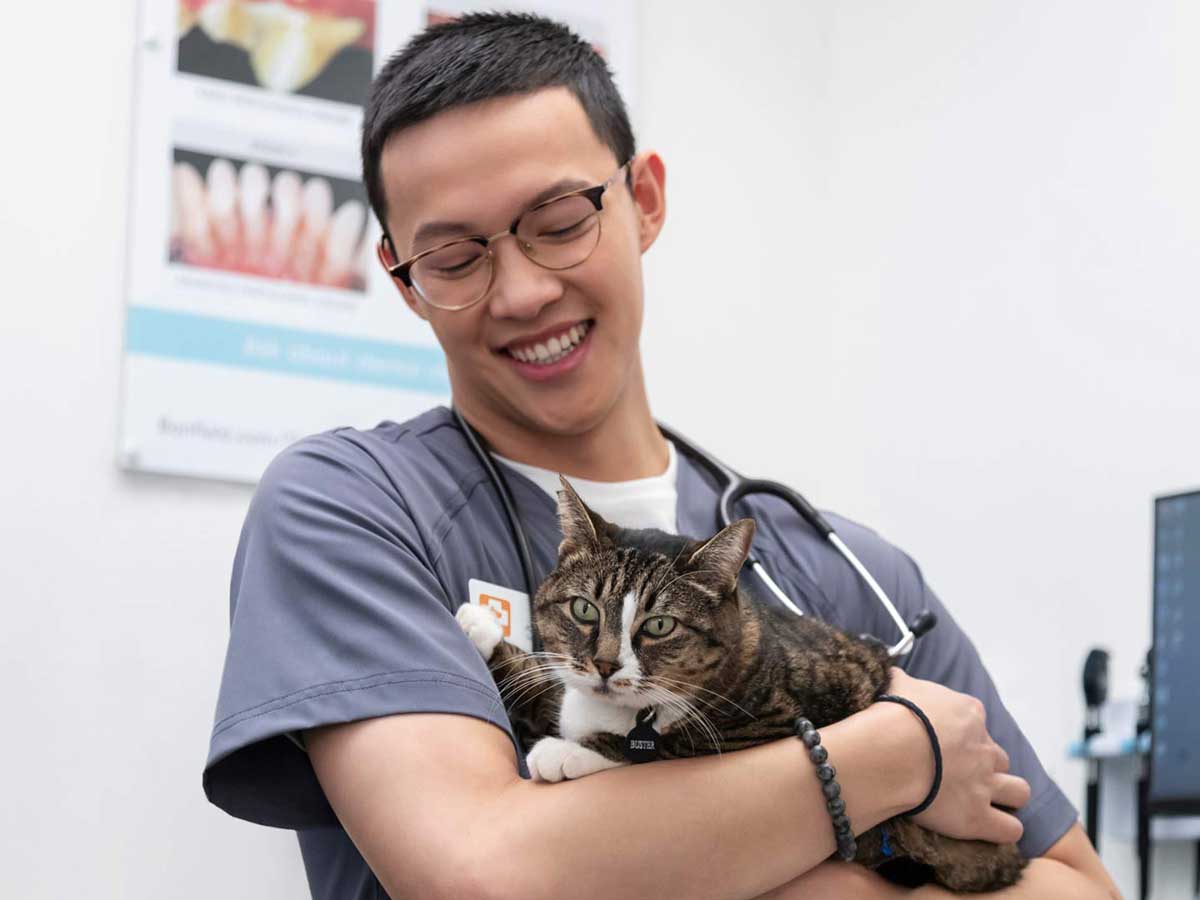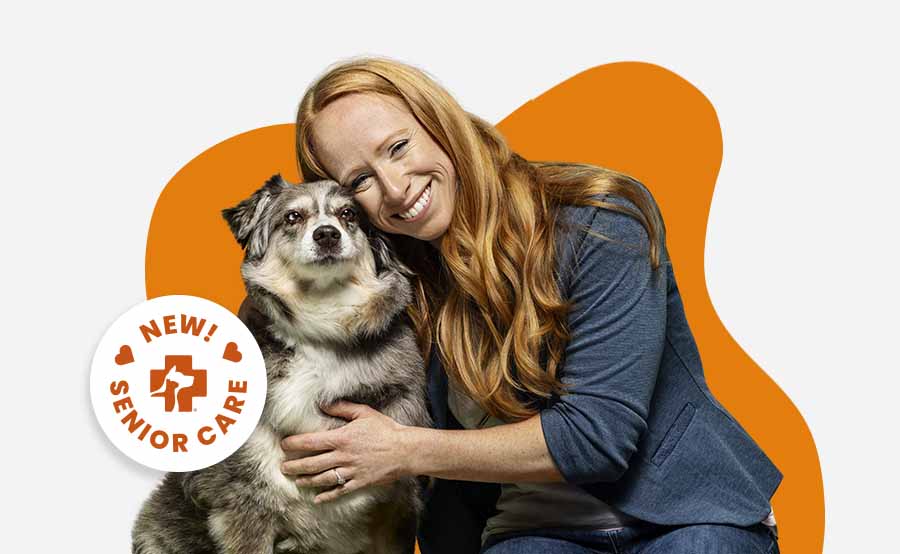understanding feline and canine cognitive dysfunction in senior pets
Often compared to dementia or Alzheimer’s disease in human beings, pets with cognitive issues often benefit from a loving home and consistent medical care.
Dogs and cats may experience behavior changes as they age. Here’s how to recognize the signs of cognitive dysfunction and what you and your vet can do to help.

Common signs of cognitive dysfunction in senior dogs and cats
When your pet gets up in age, you may start noticing symptoms such as:
- Disorientation in familiar places
- New aggression or hostility
- Lethargy
- Altered interactions with people or pets
- Losing house-training
- Wandering, pacing, and/or whining
- Changes in balance or body posture

Ways to help senior pets with cognitive issues
- Talk to your veterinary team
- Prescription medications
- Therapeutic diets
- Nutritional supplements
- Safe routines at home
Recognizing behavior changes in senior dogs and cats
Cognitive decline in pets is sometimes called “canine dementia” or “feline dementia.” Although they're not technically correct, this comparison may be useful when caring for an aging dog or cat. Your old friend isn’t doing this on purpose. They just aren't capable of remembering all the rules.

Why do aging cats and dogs develop cognitive issues?
As they age, some pets will naturally experience a mental decline that affects how they perceive and interact with the world. There’s no way to predict if a pet will develop this condition, what symptoms they’ll show, or what age they’ll appear. The best way you can help your pet is to watch for new behaviors and talk to your vet.
Risk factors for cognitive dysfunction
- Age: Canine dementia can start to appear around age 9 in dogs of any size, and cat dementia can appear around age 10–12. The likelihood and severity of cognitive decline increases with age.
- Genetic predisposition: Some breeds have a higher predisposition to cognitive decline. For example, smaller dog breeds have a higher chance of developing dog dementia simply because they live longer.
- Underlying medical conditions: Poor blood circulation and hypertension, diabetes, hyperthyroidism, epilepsy, brain tumors, sensory decline, obesity, and chronic pain can all affect brain health.
- Nutrition: A poor diet lacking nutrients, antioxidants, and omega-3 fatty acids may not adequately support brain health.
- Lifestyle: Lack of mental stimulation, being sedentary, stress, and lack of social stimulation can negatively impact cognitive well-being.
Why is my cat being aggressive all of a sudden? Why is my dog misbehaving all of a sudden?
If your pet has cognitive dysfunction, they may no longer be able to recognize familiar faces, navigate rooms in your house, or follow basic house-training. You might see anxious new behaviors like pacing, whining, or yowling at night. Your older cat or dog may even exhibit new traits like irritability and aggression.
It's sometimes difficult to determine if your senior pet is acting differently because of a mental decline, or if they're just not feeling right. Chronic pain or discomfort can sometimes result in similar symptoms. Your veterinarian can help you to determine the next best steps to the right diagnosis and treatment.
Signs of cat dementia and dog dementia:
Disorientation in once-familiar places
- Stares at walls or floors for long periods of time
- Wanders away or gets lost in familiar environments
- Doesn’t recognize familiar people, pets, or toys
- Can’t locate doors, food bowls, or other familiar objects
Changed interactions with pets and people
- No longer wants to greet people, be petted, or play
- New irritability or aggression
- New clinginess or refusal to be left alone
Loss of learned behaviors like house-training
- Stops “telling” you they need to pee or poop
- Pees or poops inside (even right after a potty break)
- Poops outside the litter box
- Stops or is slow to respond to cues or commands
- Seems unable to learn new routines
New activity levels
- Wanders aimlessly
- Paces at night
- Verbalizes at night, like yowling or whining
- Exhibits different sleep patterns (sleeps much more or less than usual)
- Shows unusual lethargy or lack of interest
- Repeats behaviors over and over
- Loses interest in food
Changes in body posture (mainly seen in dogs)
- Changes in the way they walk
- Drooping head or neck
- Swaying or losing balance
How can I help an older pet diagnosed with cognitive dysfunction?
If your pet has been diagnosed with cognitive dysfunction syndrome (CDS), feline cognitive dysfunction (FCD), canine cognitive dysfunction (CDD), or any other memory issue, talk to your vet about ways to help support your pet’s changing needs.
Veterinary care for cognitive dysfunction
Dog and cat dementia in the senior years is often a result of brain atrophy, a progressive disease that tends to get worse over time.
The first step is to evaluate your pet. Your vet will work to rule out other causes of your pet’s symptoms, plus try to identify if other health issues may be contributing to the problem. This process can be complex, and multiple diagnostic tests may need to be run to confirm a diagnosis.
Age-related cognitive disorders aren’t curable, but the symptoms can respond well to specific treatments. Certain medications, specialized supplements, and new routines at home can all help you preserve the special bond you and your pet share.

Your veterinarian may recommend:
- Prescription medications
- Prescriptions or therapies for managing increased anxiety, like monoamine oxidase for dogs and pheromone treatments for cats
- Prescription diets with select antioxidants and essential fatty acids
- Nutritional supplements containing select antioxidants, omega fatty acids, and medium chain triglycerides
- Behavior enrichment and mental exercises at home
Why do special diets help older pets with cognitive issues?
Certain antioxidants seem to make a difference for some aging pet brains and bodies. Cats and dogs can get many of these nutrients through their diet, which is why your vet may recommend specific prescription foods and supplements to help boost brain function.
It may be tempting to try to create your own pet food or supplements, but please consult with your vet. Memory involves complex chemical processes in the cerebral cortex, and there are good reasons why nutrients need to be presented in certain forms to try to help your pet’s brain.
What can I do at home to help a cat or dog with memory issues?
You can do a lot to help your older pet by meeting them where they are. This means helping to reduce their stress levels and working to keep them (and the rest of your family members) comfortable and safe.
Gentle mental stimulation can also help your pet’s brain. For dogs, running through obedience training with a few small but beloved treats can help to keep old patterns in place, even if their joints now prefer “stay” over “sit.”
Examples of how you can help at home (discuss these with your vet!):
Feeding
- Keep food and water bowls within easy reach
- Use small but highly desired treats to encourage behaviors
House-training
- Take dogs out for potty breaks more often
- Add litter boxes for cats in easy-to-reach areas
Reducing anxiety
- Maintain a regular routine
- Take dogs on regular short walks
- Avoid rearranging furniture, getting new pets, or making other household changes
Nighttime roaming
- Add walks to your daytime routine to burn off energy
- Keep the home quiet at night
Safety and social interactions
- Give agitated pets a safe space away from other pets and people
- Place padding on sharp edges and corners
- Provide easy-to-grip flooring for unsteady feet
It’s also important to stay on top of care for any other types of medical needs your pet might have. Work closely with your veterinarian to ensure you are aware of and providing all recommended treatments.
Medically reviewed by Ari Zabell, DVM and Heidi Cooley, DVM.
Custom care that grows with your pet
You can save more than 30% by bundling your pet’s preventive care with an Optimum Wellness Plan. On top of comprehensive exams, vaccinations, and diagnostic testing, these convenient packages also include unlimited office visits, 24/7 Pet Chat™, discounts on most Banfield products, and more.
Our NEW Senior Care Optimum Wellness Plan includes our most in-depth diagnostic testing yet. This helps us detect changes in organ function and overall physical health, so that we can begin any recommended treatment as soon as possible.

Senior Care
Designed to help detect early signs of age-related illness
This plan combines essential services like vaccinations and exams with in-depth diagnostic testing.
See what’s included in Senior CareSenior Care Plus
Designed to help detect early signs of age-related illness and support additional dental needs
This plan includes all the services in our Senior Care plan plus a dental cleaning.
See what’s included in Senior Care Plus Mites and mange
Mites and mange Podcast - Not Just Fluff
Podcast - Not Just Fluff






